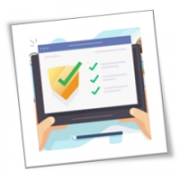Even if they’re only browsing the internet, your staff members are vulnerable to all sorts of data security threats, especially when they work remotely, use multiple devices, or connect to various networks. As a business owner, you must put browser security measures in place to minimize the risk of data loss.
Install anti-malware software
Browsers are now programmed to block web pages of most malicious sites, i.e., websites that deliver malware to your IT systems. However, even the most advanced browser can’t block every risky site, especially if a site is legitimate but has been turned into an unwitting mule for malware. Since malware infections via web browsing appear to be inevitable, you must install anti-malware software on every device you and your employees use for work. It’ll guard you against known viruses, worms, and other malicious software that are designed to steal your data and wreak havoc on your IT systems.
Have everyone in your organization use a virtual private network (VPN)
Hackers can pry into your internal channels and external communications with your customers and business partners to steal sensitive information, such as account login credentials and banking details. Fortunately, you can use a VPN to encrypt your internet traffic. A VPN will effectively bar any unauthorized party from reading any messages you and your staff send out and receive via a web browser or another medium.
Install ad blockers
While most online ads are benign, some contain widgets that send your data to third parties that can then send you more targeted ads based on the data gleaned about you. Clicking on some of these ads can bring you to malicious sites. Thankfully, you can use ad blockers to keep suspicious pop-up, rollover, and banner ads from showing up on your browsers.
Stop online activity trackers
If you don’t want a third party monitoring your surfing habits, use your browser’s private browsing mode, such as Private Browsing on Safari and Incognito on Chrome. Private browsing also protects you from malware and third-party cookies that track your online activities. You can also use browser extensions that stop social networking sites, such as Facebook and Twitter, from tracking your online behavior and collecting other information about you. Such browser extensions include Privacy Badger and Ghostery.
The simple act of browsing the internet has become fraught with peril. Do you have sufficient defenses to keep your data safe? And would you like a more comprehensive security system for your business? Our IT specialists can help you fight off cyberthreats. Let’s talk about your business requirements today.
Are you interested in learning more about cybersecurity? Call us today and discover how our wide array of tech services can safeguard your business.
If you are looking for an expert to help you find the best solutions for your business talk to GCInfotech about a free technology assessment
Published with consideration from TechAdvisory.org SOURCE




